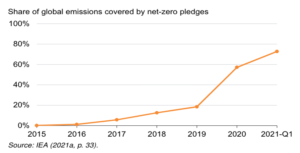A first of its kind ‘zero momentum tracker’ will track climate change and emissions reduction commitments across the private and public sectors, helping to reduce the confusion and complexities of different types of climate action commitments.
The Net Zero Momentum Tracker, which is now available for use, provides a single, consistent, platform for tracking emissions reduction commitments in a centralised database for the first time, allowing progress towards zero net emissions to be tracked, and for opportunities to strengthen commitments to be identified.
The platform has been developed by ClimateWorks Australia, with support from the Monash Sustainable Development Institute, and has been designed to track emissions reduction and other climate change commitments from organisations from both the public and private sectors.
It is the first time that emissions reduction commitments have been collated into a single platform and allows for targets set by organisations under different initiatives to be compared and contrasted in a consistent way, as well as assessing its level of compatibility with the goals of the Paris Agreement.
With companies making commitments to reduce emissions, offset emissions, invest in renewable energy, or setting targets to decarbonise investment portfolios, ClimateWorks Australia recognised a need to collate different commitments into a single, comparable, assessment.
“We began our Net Zero Momentum Tracker analysis in June last year, with the aim of bringing the emissions-reduction commitments and activities of Australia’s most influential organisations together in one place,” ClimateWorks Australia’s head of national programs Amandine Denis-Ryan said.
“The Net Zero Momentum Tracker assesses the scope of an organisation’s emissions reduction commitments and their alignment with the Paris Agreement, including across what we call the ‘four pillars’ of decarbonisation: energy waste reduction, renewable electricity, electrification and fuel switching as well as non-energy emissions.”
By providing a consistent method for assessing and comparing climate reduction commitments, ClimateWorks Australia hopes to support organisations to understand how their contributions to climate change can be reduced.
ClimateWorks hopes the tracker will be used by businesses, investors and policymakers to understand how different sectors are approaching commitments to zero net emissions, and to identify what each industry’s best practise approaches can look like.
Additionally, it provides external stakeholders a level of transparency to determine the impact of a particular climate change commitment, recognising that both private and public organisations may be participating in a range of different initiatives with different requirements and expectations.
“By analysing the extent of climate commitments and action across major economic sectors, we intend for this project to support companies better understand the steps they can take to reduce emissions,” Denis-Ryan said.
“Assessing publicly available climate commitments against the goals of the Paris Agreement sets a high bar. But in our work with organisations, we find this approach to be motivating, especially for those companies seeking to set themselves up as leaders in their sectors.”
ClimateWorks Australia said that it had focused initially on industries that have a substantial role to play in driving action on climate change and as so far undertaken an analysis of the property, retail, banking, local government and transport sectors, and will continue to expand the tracker’s coverage into the future.
Additional analysis is expected to be undertaken for the superannuation, electricity, manufacturing, resources and insurance sectors, with results to be integrated into the Net Zero Momentum Tracker platform.
Earlier sectoral assessments published by ClimateWorks Australia found that less than half of the major players in the property sector had set net zero emissions targets, and that virtually none of the major banks had made commitments to decarbonise their investment portfolios before 2050.
Climate change commitments from over 150 organisations have already been included in the Net Zero Momentum tracker, with over a quarter of organisations tracked committed to a pathway consistent with reaching net zero emissions by 2050.
“Importantly, through the Net Zero Momentum Tracker data collated to date, we can already see progress is being made. Since we completed the property and banking sector analyses in the last quarter of last year, 19% of the property companies we assessed have increased their ambition,” Denis-Ryan said added.










